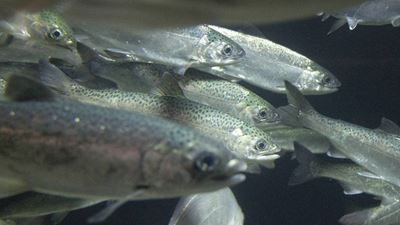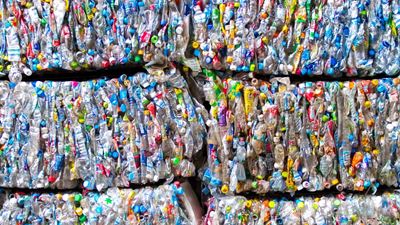Industrial effluents
Environmentally compatible and efficient: value-adding solutions for the treatment of industrial effluent flows

Effluent flows that come from production or such as are generated as the result of purification processes increasingly present great challenges to industrial companies. For the environmentally compatible treatment of these effluents, GEA supports industry with innovative process technology and first-class equipment that is both reliable and efficient for treatment of the effluent contamination. This allows not only a lasting reduction in corresponding disposal costs: the recovery of valuable content from the production flows also makes a considerable contribution to significant cost savings.
High effluent volume with sometimes strong variation in contamination with pollutants
Whether in the food and beverage industry, in refinery applications or in the steel and paper industry, high water consumption is typical of many different process stages in modern industrial production. The effluent volume incurred is also accordingly high, being sometimes contaminated with organic or inorganic, dissolved and undissolved substances or even substances that are harmful to health. The requirements of the relevant treatment technologies are as broad as the variations can be in contamination of the different effluent flows.
For lower disposal costs and higher profits: effluent treatment with GEA decanters
GEA decanters not only meet the highest demands for process reliability, hygiene and environmental protection: they are used successfully worldwide for the treatment of industrial effluents, ensuring optimal process results with the greatest possible cost efficiency and minimal use of resources. In the continuous process, they reliably separate out undesired solids, dewater them to a pourable consistency and ensure a high content of dry matter in the separated solid thanks to high separating efficiency. Whilst the clarified centrate can often be returned to the production cycle, the dewatered solids can generally be profitably recycled with further recovery of reusable substances or its volume can be reduced and it can therefore be disposed of cost-effectively.
As well as decanters, GEA also supplies complete industrial sludge dewatering plants with the associated peripherals for flexible use. All the essential process stages are condensed into one entity here with the relevant units in a lorry, trailer or – for even greater flexibility – container. The plants are complete with pipework, automated and ready for use immediately.
Energy-efficient concentration with GEA evaporation plants
As an environmentally compatible solution to effluent treatment, we additionally supply highly efficient evaporation technology with which industrial wastewater can be concentrated reliably into a high-level dry substance. The evaporated water is condensed and can be reused as process water. GEA evaporation plants are operated entirely with the use of heat from peripheral systems and therefore work extremely energy efficiently and are exemplary for the responsible use of valuable resources.
Advantages:
- Environmentally friendly and highly efficient solutions for the treatment of effluents, for example for breweries, dairies, oil mills, refineries, tanneries, paint shops, wineries, the steel and paper industry etc.
- Effluent treatment with high-performance decanters for very high solid concentration
- Low effluent contamination – reduced disposal costs
- Energy-efficient evaporation technology due to the use of waste heat for reliable concentration
- Mobile systems for flexible use

Creating value from waste in land-based aquaculture

A reduced footprint for PET recycling and rPET
Products & Technologies
Showing 4 of 11

CO2 saving processes
CO2 savings come from reducing fossil fuel demand either by increasing energy efficiency or by separating CO2 from flue gas streams along with long-term fixation in valuable products or storage. GEA offers products and processes for all relevant stages.

Decanter Centrifuge
The decanter’s hour has come as soon as the solids content in the suspension to be processed is particularly high. These machines provide the benefits of high clarifying efficiency and maximum dewatering as well as the separation of liquids with the simultaneous removal of solids. The main requirements in this respect include a high bowl speed, a...

Ejector Systems
Ejectors, are devices for the conveyance, compression or mixing of gases, vapors, liquids or solids in which a gaseous or liquid medium serves as the motive force. They are "pumps without moving parts".

Filtration and Separation
Efficient dedusting of flue and exhaust gas with GEA´s reliable filtration and separation systems.
Downloads
GEA Insights India
All pharmaceutical freeze-drying vials are the same! Aren't they?
Whether it’s a fad or the future, 100% vial traceability is becoming an increasingly important consideration in the pharmaceutical freeze drying industry. Keeping a close eye on developments is GEA. We’re investigating possible solutions and, what’s more, we have the experience, expertise and know-how to implement them.
Alcohol-free beer: They want it all – they want less
There was a time when the phrases ‘non-alcoholic beer’ and ‘tastes good’ were seldom used together in the same sentence, particularly by consumers. But low-proof and alcohol-free beers have come a long way – many of them now refreshing drinks in their own right – thanks in no small part to technology from GEA.
Innovating patient care with aseptic spray drying
At GEA, our commitment to engineering for a better world fuels our pursuit of innovative solutions that enhance patient care and safety. One of our most promising ventures in recent years is aseptic spray drying – a technology that promises to revolutionize pharmaceutical manufacturing.